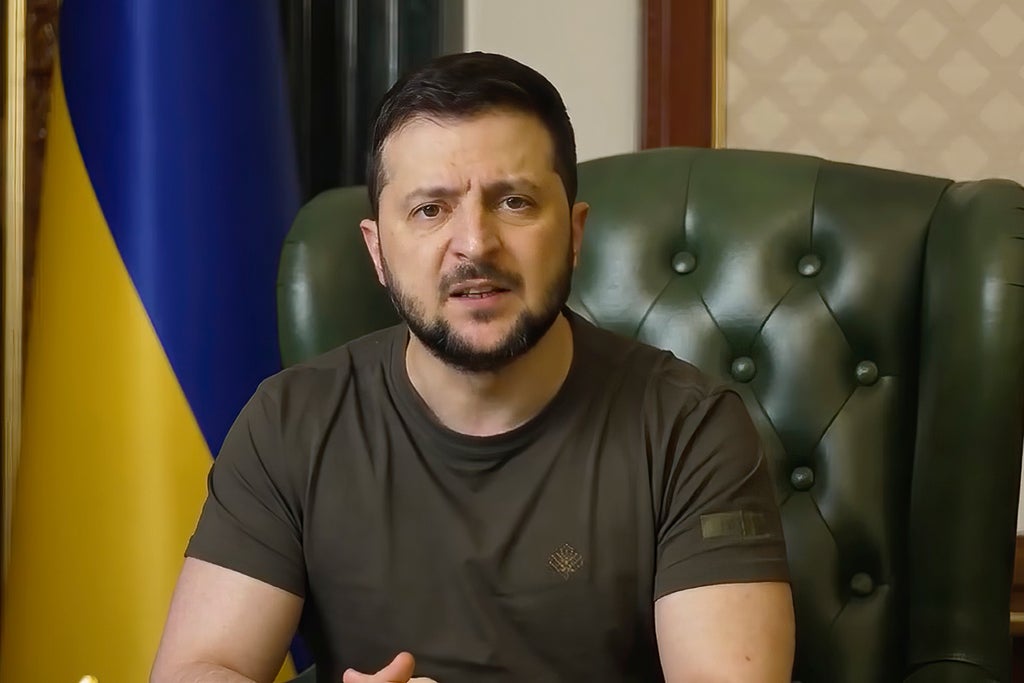
Ukrainian President Volodymyr Zelenskyy is among five people named Thursday as recipients of the John F. Kennedy Profile in Courage Award for acting to protect democracy.
Zelenskyy was chosen because of the way he has “marshaled the spirit, patriotism and untiring sacrifice of the Ukrainian people in a life-or-death fight for their country,” as Russia pours in troops and assaults cities and towns, the John F. Kennedy Library Foundation said.
The foundation said four U.S. officials were chosen for standing up for free and fair elections, as the system is challenged in ways it has never been before.
They are: Republican U.S. Rep. Liz Cheney of Wyoming, Michigan Secretary of State Jocelyn Benson, Arizona House Speaker Rusty Bowers and Fulton County, Georgia, elections worker Wandrea “Shaye” Moss.
Caroline Kennedy and her son, Jack Schlossberg, will present the awards May 22 at the John F. Kennedy Presidential Library in Boston. The award was created by the family of the late president to honor public figures who risk their careers by embracing unpopular positions for the greater good, and is named after Kennedy’s 1957 Pulitzer Prize-winning book, “Profiles in Courage.”
“There is no more important issue facing our country, and the world, today than the fight for democracy,” Kennedy said in a statement. “The war in Ukraine has shown the world that we can’t take freedom for granted, and the courage of our elected officials in the U.S. reminds us that as citizens we each have a responsibility to protect our democracy and exercise our fundamental right to vote.”
Cheney chaired the Republican House Conference before being ousted from her post last year because of her unrelenting criticism of former President Donald Trump and statements blaming him for the violence at the U.S. Capitol on Jan. 6, 2021.
The foundation said Cheney “broke with most in her party, urged fidelity to the Constitution, and stood her ground with honor and conviction,” and that she has remained a “consistent and courageous voice in defense of democracy.”
Michigan was one of the battleground states where Trump allies demanded further review of the 2020 election. Benson defended the certification of the results.
Protestors showed up at her home one evening in December 2020, angry about what they incorrectly said was voter fraud leading to Trump’s loss. The foundation said Benson defended the will of Michigan voters, repeatedly refused to back down from fulfilling the duties of her office and continues to speak out about the risks to free and fair elections.
Bowers, a Republican, broke ranks with many in his party in December 2020 when he rejected a request from Trump lawyer Rudy Giuliani for the Arizona Legislature to step in and replace electors legally pledged for Joe Biden with others who would support Trump.
The foundation said Bowers made a “decision of conscience,” for which he endured persistent harassment and intimidation tactics from Trump supporters, and he acted again to protect the integrity of Arizona elections by stopping a wide-ranging election bill that would eliminate nearly all forms of early voting and require ballots to be counted by hand, though Republicans are still trying to pass these changes.
Moss has worked for the Fulton County elections department since 2012 and supervised the absentee ballot operation during the 2020 election. Trump allies falsely claimed she engaged in ballot fraud. The foundation said “despite the onslaught of random, undeserved and malicious attacks,” Moss continues to do the “hard and unseen work to run our democracy.”







